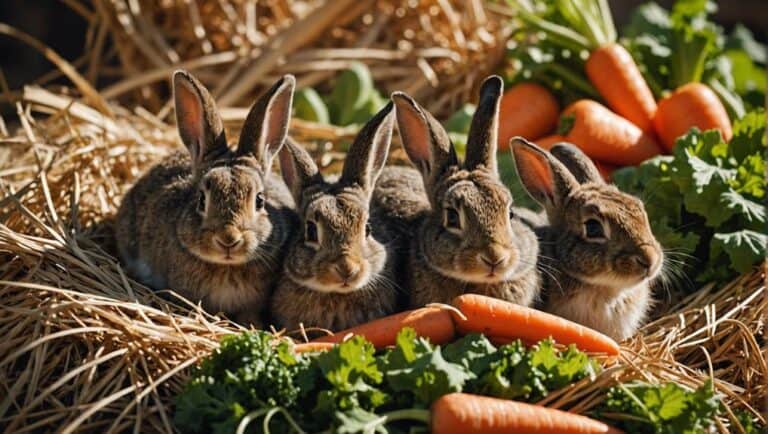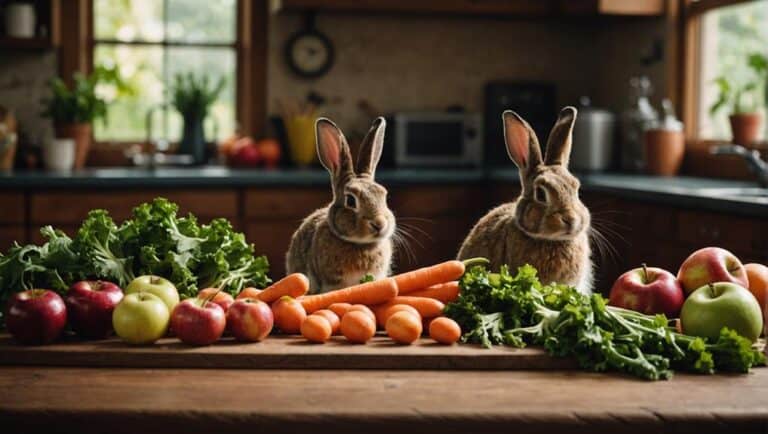You might not realize that a rabbit’s diet can greatly impact its health and longevity, making proper nutrition vital for new bunny owners. Many well-intentioned pet parents unknowingly make important mistakes that can lead to serious health issues for their furry companions. From overfeeding pellets to misunderstanding portion sizes, these missteps can have lasting consequences. It’s essential to understand the right balance and variety in your bunny’s diet to guarantee ideal well-being. Let’s explore some common pitfalls that can easily be avoided, guaranteeing your bunny thrives in a healthy environment. Additionally, understanding the cost associated with caring for a rabbit is crucial, including factors like the baby bunny price range that varies depending on breed and location. By choosing to invest in high-quality hay, fresh vegetables, and appropriate pellets instead of cheaper, less nutritious alternatives, you’re setting your bunny up for a healthier future. Taking the time to research and educate yourself about their dietary needs will ultimately save you from costly vet bills down the line.
Contents
Overfeeding High-Calorie Pellets
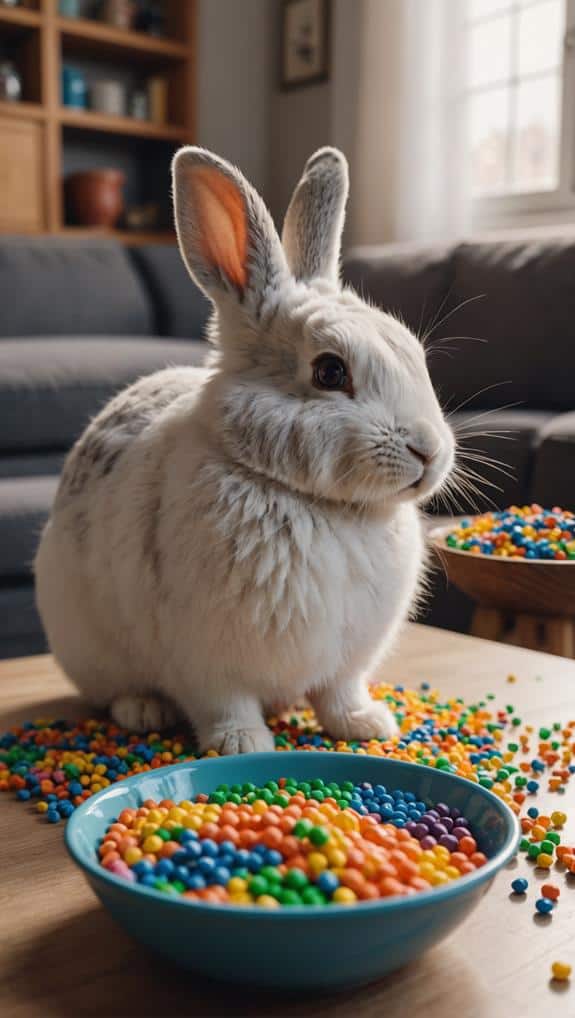
Many bunny owners unknowingly contribute to their pet's health issues by overfeeding high-calorie pellets. This common mistake can lead to significant weight gain and obesity, increasing the risk of serious health conditions like diabetes and heart disease.
It's essential to recognize that the recommended daily amount of pellets for small rabbits is only 1/4 to 1/2 cup, tailored to their size and energy level. Incorporating fresh greens and a variety of ideal and resilient plants for bunny habitats can help create a more balanced diet while promoting natural foraging behaviors.
Furthermore, if you're using muesli-style pellets, be aware that they may promote selective eating. Rabbits often gravitate toward high-sugar, low-fiber components, which further disturbs their nutritional balance. High-calorie diets disrupt their natural foraging behavior, potentially resulting in gastrointestinal stasis, a life-threatening condition.
To support your bunny's health, consider switching to a high-fiber, low-calorie pellet from reputable sources, like Oxbow®. Such choices guarantee a balanced diet and promote ideal digestive health.
Insufficient Hay Intake
Overfeeding high-calorie pellets can lead to significant dietary imbalances, often overshadowing the importance of hay in a rabbit's diet. Fresh grass hay should comprise 80% of your rabbit's daily intake, roughly matching their body size in volume. This high fiber content is critical for maintaining a healthy digestive system and preventing issues like obesity, as excess weight is a common concern among pet rabbits.
Insufficient hay intake can result in serious digestive issues, such as gut stasis, which may necessitate veterinary intervention.
Moreover, a lack of hay can contribute to dental problems, including overgrown teeth and dental disease. Rabbits require the constant chewing of hay to keep their teeth appropriately trimmed and healthy. While some owners might consider alternatives like alfalfa, it's important to avoid these for adult rabbits due to their high calcium and protein levels, which can cause long-term health complications.
Proper nutrition is essential for the overall health and well-being of your pet.
To promote your rabbit's overall health and longevity, guarantee they've regular access to high-quality hay, such as Oxbow Timothy hay. Providing the right type and amount of hay not only supports digestion but also plays a key role in preventing many health issues, confirming your furry friend lives a happy and healthy life.
Neglecting Leafy Greens
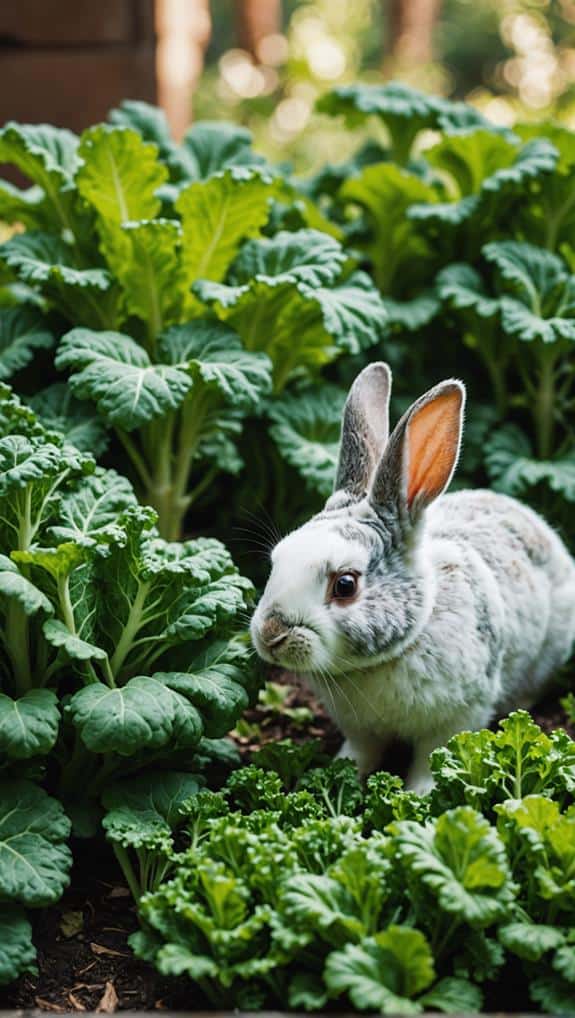
Leafy greens are vital for your rabbit's diet, making up about 10-15% of their daily intake.
Incorporating a variety of safe vegetables, like kale and romaine lettuce, guarantees they receive essential nutrients while preventing health issues.
Consult a vet for safe greens to confirm you're providing the best options available.
Importance of Leafy Greens
Neglecting leafy greens in your rabbit's diet can lead to serious health issues. Leafy greens are essential for providing important vitamins and minerals necessary for your rabbit's well-being. They also contribute to hydration and fiber intake, which are crucial for maintaining digestive health.
Dark leafy vegetables like romaine lettuce, kale, and cilantro should be your go-to choices, as they're rich in nutrients and low in sugar, making them perfect for your furry friend.
It's important to avoid iceberg lettuce, as it offers minimal nutritional value and can cause digestive problems due to its high water content and low fiber. To guarantee balanced nutrition, you need to feed your rabbit a variety of leafy greens daily. This variety prevents deficiencies that could lead to serious health concerns like gut stasis and dental disease.
Aim to provide at least 1-2 cups of mixed leafy greens per 5 pounds of your rabbit's weight each day. Supplement this with small amounts of other vegetables and hay for peak health.
Safe Vegetable Options
Many rabbit owners often overlook the variety of safe vegetable options available beyond leafy greens. While leafy greens like kale, romaine lettuce, and parsley are essential for providing nutrients and fiber, you can enhance your rabbit's diet with other safe vegetables.
Carrots, bell peppers, and zucchini, for instance, offer additional vitamins and can make mealtime more exciting.
When introducing new vegetables, make certain they're fresh and free from pesticides. Wash them thoroughly to eliminate any harmful chemicals. Avoid starchy vegetables and those high in sugar, as they can disrupt your rabbit's healthy life.
Instead, focus on options that complement leafy greens and maintain a balanced diet.
Correct Serving Sizes
A balanced diet for your rabbit requires careful consideration of serving sizes, particularly when it comes to leafy greens. These greens should constitute about 10-15% of their daily intake to guarantee they receive essential nutrients while minimizing digestive issues.
Here are some key points to remember regarding the correct serving sizes of green leafy vegetables:
- Feed 1 cup of greens per 2 pounds of body weight daily.
- Introduce leafy greens gradually to prevent digestive upset.
- Offer a variety of rabbit-safe greens like romaine, kale, and parsley.
- Monitor your rabbit's preferences and adjust portions accordingly.
- Avoid iceberg lettuce due to its low nutritional value.
Excessive Fruit Treats
Occasionally indulging your rabbit with fruit treats can seem harmless, but overdoing it can lead to significant health issues. Rabbits aren't designed to consume high-sugar foods; excessive fruit treats can disrupt their digestive system and lead to imbalances in gut bacteria.
This disruption can increase the risk of obesity and gastrointestinal problems, both of which are serious concerns for your pet's health.
To maintain a balanced diet, it's recommended that you limit fruit consumption to just one teaspoon per pound of your rabbit's weight each day. While fruits like bananas and grapes are often favorites, they should only be given sparingly and not as regular dietary staples.
Relying on Muesli Mixes
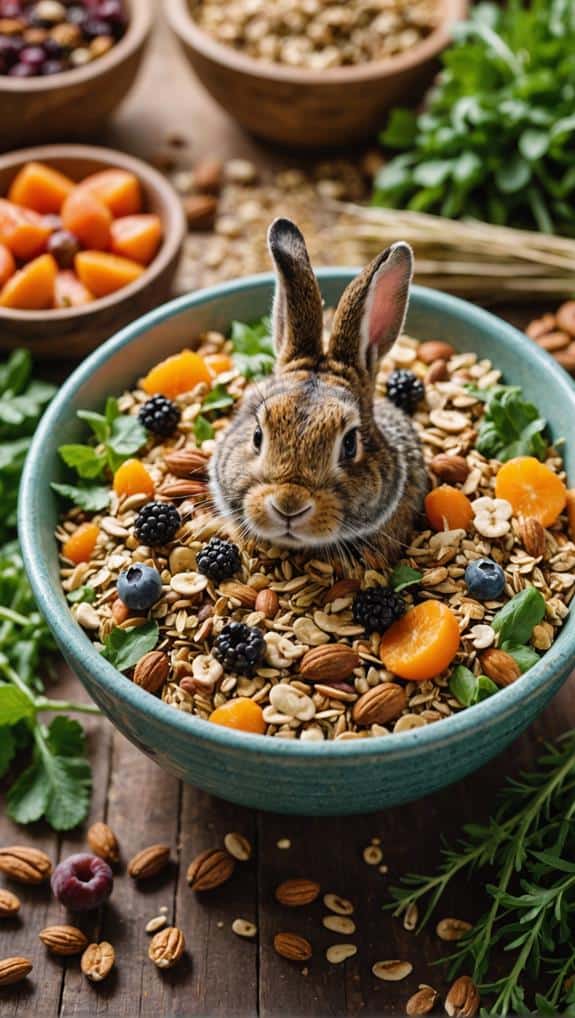
Relying on muesli mixes for your rabbit's diet can lead to serious nutritional pitfalls. Many new bunny owners mistakenly choose these colorful mixtures from pet stores, unaware of the consequences.
While they might seem appealing, muesli blends can create several issues:
- Selective Eating: Rabbits may pick out sugary pieces, leading to an imbalanced diet.
- Low Fiber Content: Muesli mixes often lack the essential fiber needed for proper digestion.
- Obesity Risk: High-calorie components can cause overconsumption, leading to weight gain.
- Nutritional Deficiencies: The remaining ingredients may not provide adequate nutrients, risking health problems.
- Health Issues: Insufficient nutrition can lead to serious conditions like dental disease and gut stasis.
Instead of muesli, opt for plain, high-fiber pellets that cater to your rabbit's specific dietary needs.
By avoiding these common mistakes, you'll be ensuring a balanced diet that promotes your bunny's overall health and well-being.
Ignoring Fiber Needs
Ignoring your rabbit's fiber needs can lead to serious digestive problems, including gut stasis, which can be fatal.
To guarantee peak health, hay should make up about 80% of their diet, with an amount roughly equal to their body size available at all times.
A low-fiber diet not only disrupts digestion but also jeopardizes dental health, making it vital to prioritize hay over sugary treats.
Importance of Hay
Hay is essential in a rabbit's diet, yet many owners often overlook its importance in meeting their pets' fiber needs. New rabbit owners frequently make mistakes regarding hay, which can lead to serious health issues. Understanding the significance of hay can greatly enhance your rabbit's well-being.
- Hay should make up at least 80% of your rabbit's diet.
- Fresh hay must be available at all times, ideally equal to your rabbit's body size.
- Timothy hay is recommended for adult rabbits, providing balanced fiber without excess calcium.
- Insufficient fiber can lead to obesity, dental disease, and digestive issues.
- Regularly monitor your rabbit's hay intake to guarantee it remains the primary diet component.
Consequences of Low Fiber
A diet lacking in fiber can have dire consequences for your rabbit's health. Insufficient fiber intake can lead to severe digestive issues, particularly gut stasis, a potentially life-threatening condition. When fiber levels are low, the normal movement of food through your rabbit's digestive system becomes disrupted, increasing the risk of painful blockages.
Moreover, fiber plays an essential role in maintaining dental health. Without adequate fiber, your rabbit may develop dental disease and tooth overgrowth, leading to pain and difficulty eating.
Adult rabbits should have access to hay roughly the size of their body daily, with hay comprising about 80% of their diet to guarantee they meet their fiber needs.
Additionally, a low-fiber diet can contribute to obesity, which brings about various health problems, including urinary issues and a decreased overall lifespan.
To promote a healthy, happy rabbit, prioritize fiber in their diet. By understanding the consequences of low fiber and providing the necessary dietary components, you can help your rabbit thrive and avoid serious health complications.
Skipping Nutritional Variety
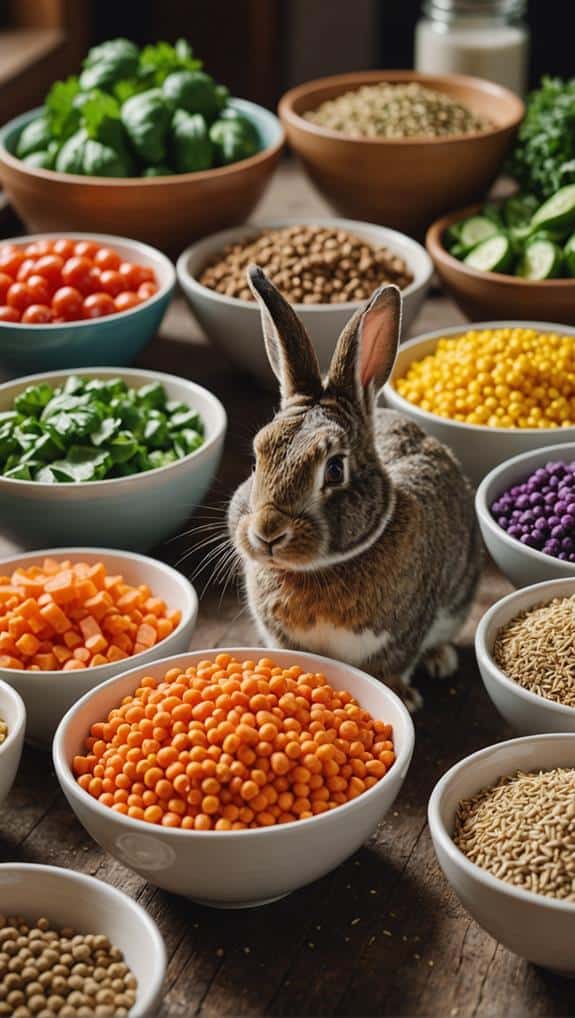
When you skip nutritional variety in your rabbit's diet, you're putting their health at risk. A lack of diverse foods can lead to nutritional deficiencies, as different vegetables and hay types provide essential nutrients important for overall well-being. Feeding your bunny a single type of green, like kale, can create imbalances.
It's essential to introduce a range of leafy greens, such as:
- Romaine lettuce
- Cilantro
- Parsley
- Dandelion greens
- Spinach (in moderation)
By skipping nutritional variety, you also expose your rabbit to high-sugar foods, which can increase the risk of obesity and digestive issues.
A well-rounded diet should consist of at least 80% hay and a mix of greens, with limited fruits. Regularly rotating hay types—like Timothy, Orchard, and Meadow hay—ensures adequate fiber intake, preventing gut stasis and promoting a healthy digestive system.
Offering Unsafe Vegetables
Many rabbit owners unknowingly introduce unsafe vegetables into their pets' diets, which can lead to serious health issues. For instance, offering unsafe vegetables like iceberg lettuce might seem harmless, but it contains minimal nutritional value and can cause digestive upset due to its high water content.
Additionally, certain vegetables, including potatoes, onions, and garlic, are toxic to rabbits and must always be avoided for their safety. Rhubarb leaves also pose a significant risk, as they contain high levels of oxalic acid, harmful to rabbits if ingested.
While some fruits and vegetables can be safe in moderation, avoid items like corn and beans, as they can lead to digestive distress.
It's vital to introduce a variety of rabbit-safe leafy greens, such as kale, romaine, and parsley, while gradually eliminating unsafe vegetables from their diet.
Misunderstanding Portion Sizes
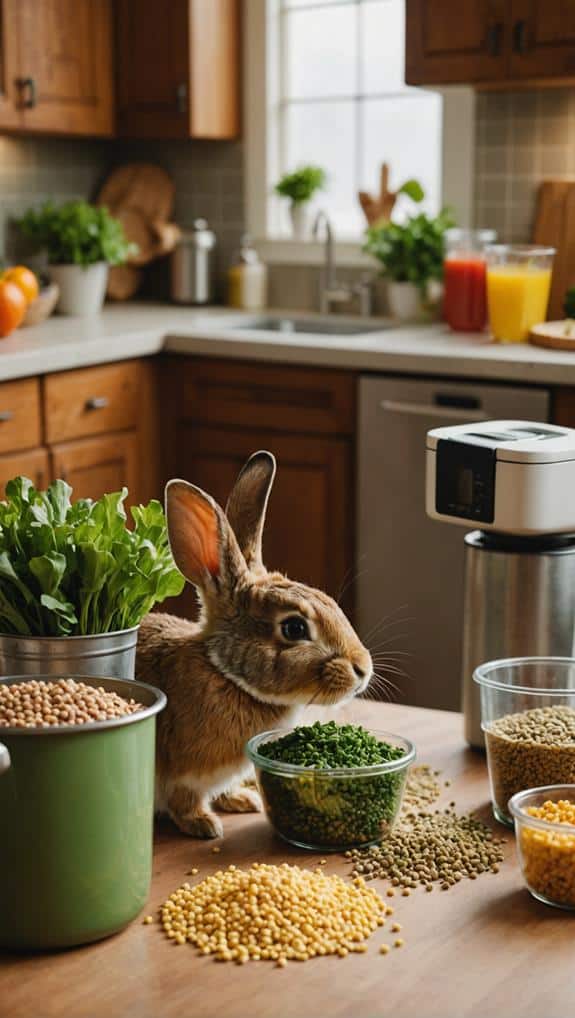
Understanding portion sizes is essential for maintaining your rabbit's health, yet new bunny owners often misjudge what constitutes appropriate servings.
Proper portion control is vital for ensuring balanced nutrition and preventing obesity. Here are key points to keep in mind:
- Pellets: Limit to 1/8 cup daily for small rabbits to avoid excessive calories.
- Vegetables: A handful isn't enough; focus on a small portion of leafy greens daily.
- Hay: Provide hay equal to your rabbit's body size to support digestion and fiber intake.
- Fruits: Treats should be limited to just one teaspoon per pound of your rabbit's weight; excessive sugar can lead to health issues.
- Perception: Recognize that even healthy foods can lead to problems if served in large quantities instead of controlled amounts.
Final Thoughts
In the intricate tapestry of bunny care, proper nutrition weaves the strongest threads. By avoiding common blunders like overfeeding pellets and neglecting hay, you can help your furry friend thrive. Remember, a balanced diet rich in fiber and variety is the key to keeping those little ears perked up and spirits high. Treat your rabbit's plate like a painter's palette—colorful and diverse—to guarantee a vibrant, healthy life. Your attention to their diet can make all the difference!




